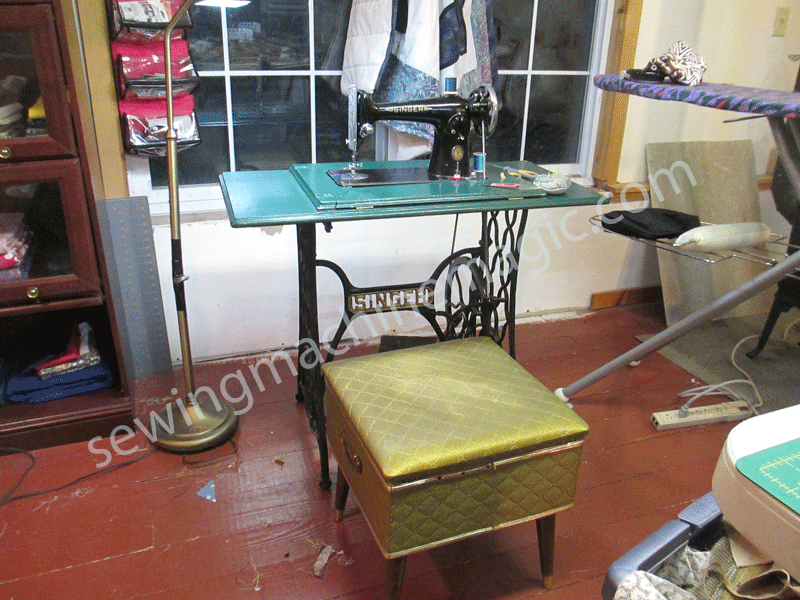In honor of the upcoming Central New York TOGA, I have decided to sew only on treadles. Except for the serger.
I started out today sewing on the 15-91 and when I finished that project, I headed upstairs to get the 201-3 out of its treadle stand and move it out to the sewing loft.
I am used to hauling stuff all by myself. Steven had been called to an emergency and I figured I could just do it.
The stand is not heavy. It is the one that I refurbished last year. It has no drawers so it is relatvely light. Getting the machine out was no problem I have a coil spring installed on this machine. But it didnt really pop right out. I had to take the hand wheel off. The belt is 1/4 inch diameter. I think it is too thick. I must check to see if there is a smaller diameter coil spring.
Once I got the machine out I wheeled it to the top of the stairs. I inched it down each step, one at a time but it is an awkward thing. The pitman rod popped off of the foot pedal. But it didn't break. That was when I thought to myself
"What is a 60 year old woman doing moving a 100 year old treadle stand down a set of stairs?"
I got it down without breaking the pitman and I wheeled it out to the bottom of the sewing loft stairs.
There it sat until Steven got home from his call. Wilson watched over it.
Treadling is not too hard. It takes practice and I know I don't have a good, easy rhythm. But once I tightened the cone bearings and the pitman rod so that it wasn't so clunky, I found it easier to treadle with a consistent "stroke" . The noise of the coil spring belt is not unpleasant. When I finish a seam and stop there is a noise that sounds almost bird like. Chirpy.
I actually like that sewing stool as a sewing chair. It is just the right height. I likely will revert to the office chair because it has wheels and I like to be able to easily move it back and forth. But today I was feeling all vintage.



...and wasn't it your BIRTHDAY? Happy belated birthday!
ReplyDeleteThank you!
DeleteThe only downside of treading is for me, the inability to do reverse. The machine is just so lovely and well running, but no reverse. So I have been using it only for scrap piecing. The other little issue is I am 5'8" and it is a wee bit tight treading in a parlor cabinet. But the cabinet is so lovely.
DeleteLinda
Happy Birthday! ...(thanks for the tip Michelle)
ReplyDeleteCan you feel a big (or small) difference between treadling on the 201-3 and a 66?
What are your plans for TOGA?
Thank you
DeleteThe difference for me is that my 66 (it's a Red Head) has no reverse. The 201 does. Huge difference. Otherwise I don't think there is too much difference. I like the 201 stitch a bit better, I guess.
TOGA plans are ongoing. Will likely post a page on the blog when they are finalized.
I tried to treadle sitting on my office chair with wheels and I went rolling backwards, did not work well! LOL I like your sewing stool!
ReplyDeleteTreadling with an office chair with wheels isn't very easy. I tend to keep moving back from the machine when I try. Now you need a hand crank. Who knows, since you are having the TOGA, maybe one will find it's way to you then. They are fun!
ReplyDeleteOh I have two hand cranks; a 115 and a 28. The 115 has a repro crank, but the original hand wheel. The 28 has a vintage crank but not original to that machine. I paid big eBay dollars for it when I was a newbie.
DeleteWhen I first started at a commercial sewing shop (back in the good old days when Americans still made clothes), we all sewed on old industrial machines that had NO REVERSE. This didn't slow us down very much. You backtack - start sewing a few stitches, stop, shift the fabric back to the starting stitch and begin again - 1 second, maybe 2. Same for the end of the seam. It's really not hard and when there's no reverse lever, you just get used to it....like you get used to pumping a treadle or cranking the crank instead of pressing on a foot or knee control.
ReplyDeleteSome, who sew clothes, advise against back tacking at all. http://malepatternboldness.blogspot.com/2013/06/the-great-sewing-machine-backstitch.html I don't make clothes. I piece things and find that backstitching is pretty important. With my 201 or 15, however, I can just move the SLR (stitch length regulator) to a tiny stitch and that works. With my 66 red head, not so easy since it is not a lever but a round knob.
DeleteOnce I have found a stitch length I care for on the 66 I mark it with a piece of painters tape cut into a narrow strip. As long as I turn the knob less than one revolution the 12:00 position will indicate my original stitch length.
DeleteSome tailors are perfectionists and their work shows it! I just crank everything out - good enough for who it's for
Delete